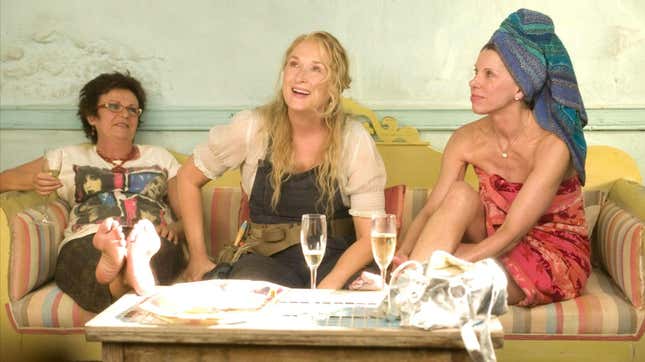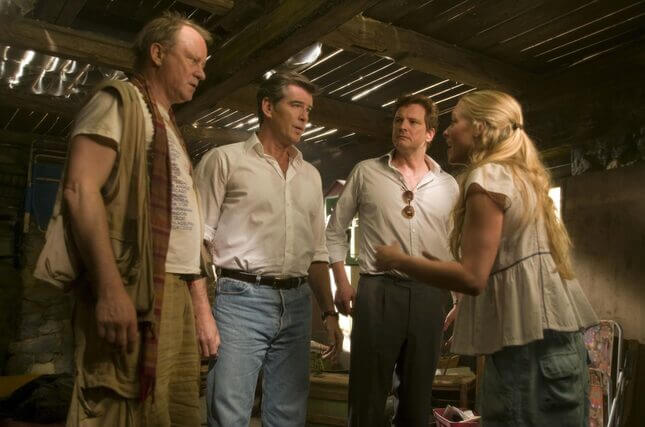15 Years Ago, ‘Mamma Mia!’ Showed Us How Family Abolition Could Change Everything
Between all the ABBA, it championed a radical version of love, friendship, and nonbiological family.
EntertainmentMovies

“You know, I have no clue which one of you is my dad, but I don’t mind!”
I’m sure you know the story, but just in case you don’t: This iconic line was delivered by Sophie (Amanda Seyfried) towards the end of the beloved film Mamma Mia! Earlier, Sophie had secretly invited three of her mother Donna’s (Meryl Streep) past lovers—Sam (Pierce Brosnan), Harry (Colin Firth), and Bill (Stellan Skarsgård)—to her wedding. Sophie wanted her father to walk her down the aisle; the problem is, she grew up not knowing who her father was. She had hoped that by inviting the contenders to the island where she and Donna live, she would immediately be able to spot who was family and heal a part of her she always felt was broken. But when the three men arrive, Sophie feels a bond with each one, which only adds to her existential confusion. In the end, Donna walks Sophie down the aisle, and then reveals that she is unsure which of the men the father is anyway. “I just want to say it’s great to have even a third of Sophie,” Harry says happily. All three agree that a paternity test is unnecessary, and as she stands before her fiancé, Sophie proclaims that she doesn’t need to know who her father is after all.
Mamma Mia! turns 15 this week, and every element—impeccable casting and costuming, a beautiful setting on the isles of Greece, ABBA—keeps us obsessed. Rumor has it the cast was tipsy during most of their performances, and we glimpse this in the best way: They are loose, giggly, and seem to be having the time of their lives, just as we have the time of our lives watching them. But I would argue there is a deeper reason for our cultural infatuation: We appreciate how the film is able to complicate traditional notions of family and community. Put plainly, Mamma Mia! champions family abolition.
There are many different ways to characterize a family. In her 2022 book Abolish the Family: A Manifesto for Care and Liberation, writer Sophie Lewis offered one definition, naming the family as a term “we use for the fact that care is privatized in our society.” Lewis’ criticisms of the nuclear family are multifaceted. She condemns the unequal power dynamics between a breadwinner and the person or people “making sandwiches with the hard-won bread”; the encouraged, near-total dependence of children on their guardians; and the “absurdly unfair distribution of labor” that often accompanies parenthood. Many people would agree with Lewis on these points at least: There are countless studies devoted to the loneliness and exhaustion of motherhood, or the number of children abused by their own parents. And yet, pushing these statistics a step further—admitting that these inequities are a symptom of the nuclear family structure, and pushing to abolish it—is seen as the highest taboo.
-

-

-

-

-

-

-

-

-

-

-

-

-

-

-

-

-

-

-

-

-

-

-

-

-

-

-

-

-

-

-

-

-

-

-

-

-

-

-

-









































